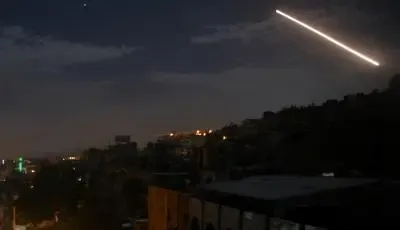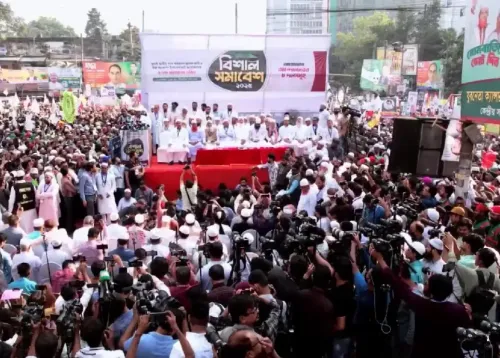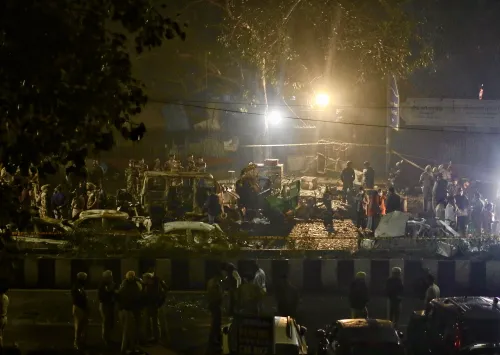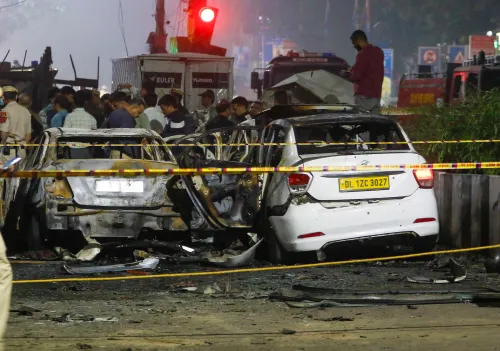What is the current death toll in Syria's Sweida after the recent Israeli airstrike?

Synopsis
Key Takeaways
- The death toll in Sweida is approaching 600.
- Israeli airstrikes have intensified tensions in the region.
- Local Druze armed groups are in conflict with Syrian government forces.
- There is a significant humanitarian crisis with mass displacements.
- International condemnation of the violence is growing.
Damascus, July 18 (NationPress) The death toll from the recent violent clashes in southern Syria's Sweida province has surged to nearly 600, as conflicts escalated following an Israeli airstrike on the outskirts of the provincial capital of Sweida, as reported by state-run media and a conflict monitor.
Syria's official news agency SANA indicated that an Israeli warplane executed another air raid targeting the vicinity of Sweida city, just a day after previous strikes targeted military and notable state sites in Damascus. Fortunately, there were no immediate reports of casualties from Thursday's strike.
This escalation follows reports from the Syrian Observatory for Human Rights, which stated that at least 597 individuals have lost their lives since July 13, when hostilities broke out between local Druze armed groups and Syrian government forces. This has been described as one of the most lethal episodes of intra-Syrian conflict in recent years, according to Xinhua news agency.
The observatory has also warned of a worsening humanitarian crisis as Arab Bedouin families continue to flee regions across Sweida, facing intimidation, sectarian reprisals, and dire living conditions.
In a statement released on Thursday night, the Syrian interim authorities mentioned that military forces had retreated from Sweida as part of a US-Arab mediation effort aimed at reducing the deadly violence. However, they accused local armed groups of breaching the ceasefire and committing “horrific crimes” against civilians.
The aftermath of this withdrawal has been described as “a blatant breach of these understandings,” with allegations that the factions have engaged in a “horrific campaign of violence” threatening civil peace and pushing the nation towards chaos and security collapse.
Specific details on the violations were not disclosed. Reports emerged hours later of summary executions and sectarian reprisal attacks, particularly targeting members of Bedouin tribes.
The authorities reiterated their commitment to protect all Syrians and urged the international community to support efforts in restoring stability.
Despite the military's withdrawal by dawn on Thursday, the situation on the ground remains precarious, with significant displacement and concerns over potential renewed Israeli airstrikes compounding the already critical humanitarian situation.
Additionally, Arab tribes from Deir al-Zour province and northern Syria, along with interim government loyalists from Idlib, are reportedly mobilizing to assist the Bedouins in Sweida, intensifying the situation in southern Syria.
The escalation in Sweida commenced on Sunday, following an incident where armed members of a Bedouin tribe in the countryside reportedly assaulted and robbed a young Druze man near the town of al-Masmiyah, situated along the Damascus-Sweida highway. This shocking attack sparked retaliatory kidnappings, escalating into full-scale clashes among local Druze fighters, government forces, and Bedouin militias.
On Monday and Wednesday, Israel conducted multiple waves of strikes on Damascus and Sweida, claiming these actions were necessary to prevent harm to the Druze minority. These attacks have received strong condemnation from the international community.
Following the Israeli airstrikes on Wednesday, a fragile ceasefire between Syria's interim government and Druze spiritual leaders came into effect.









